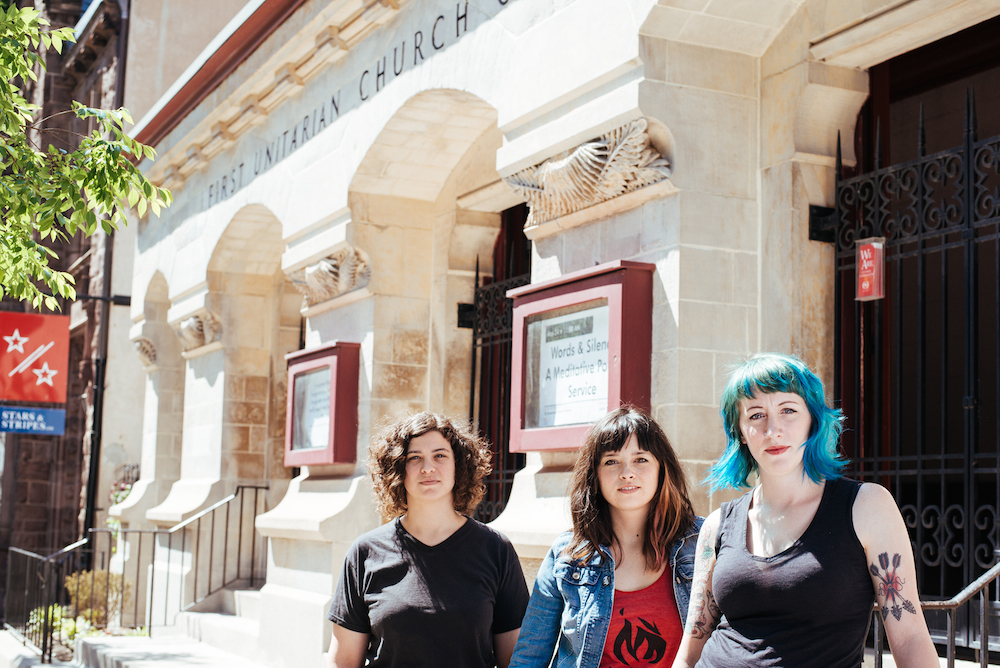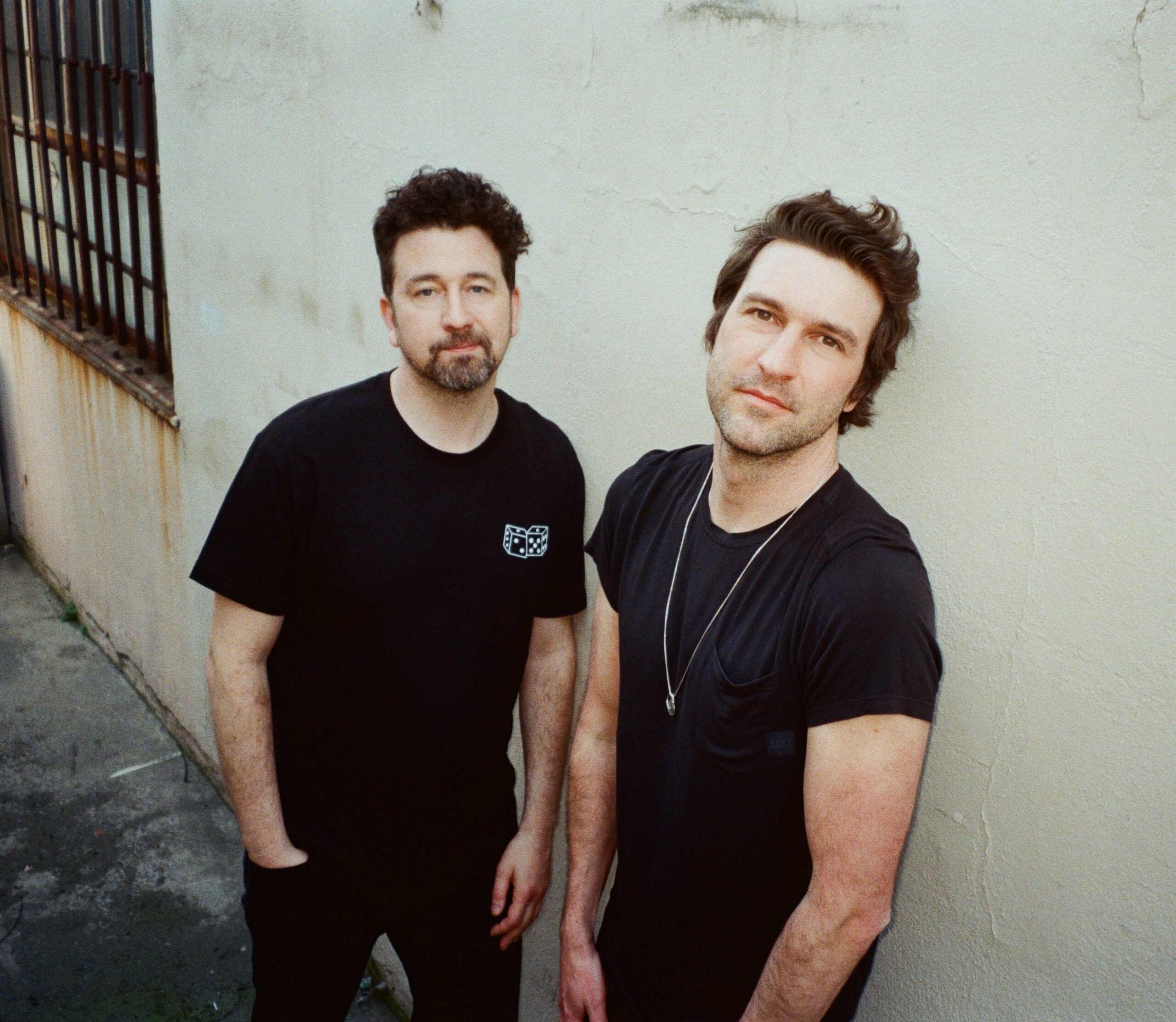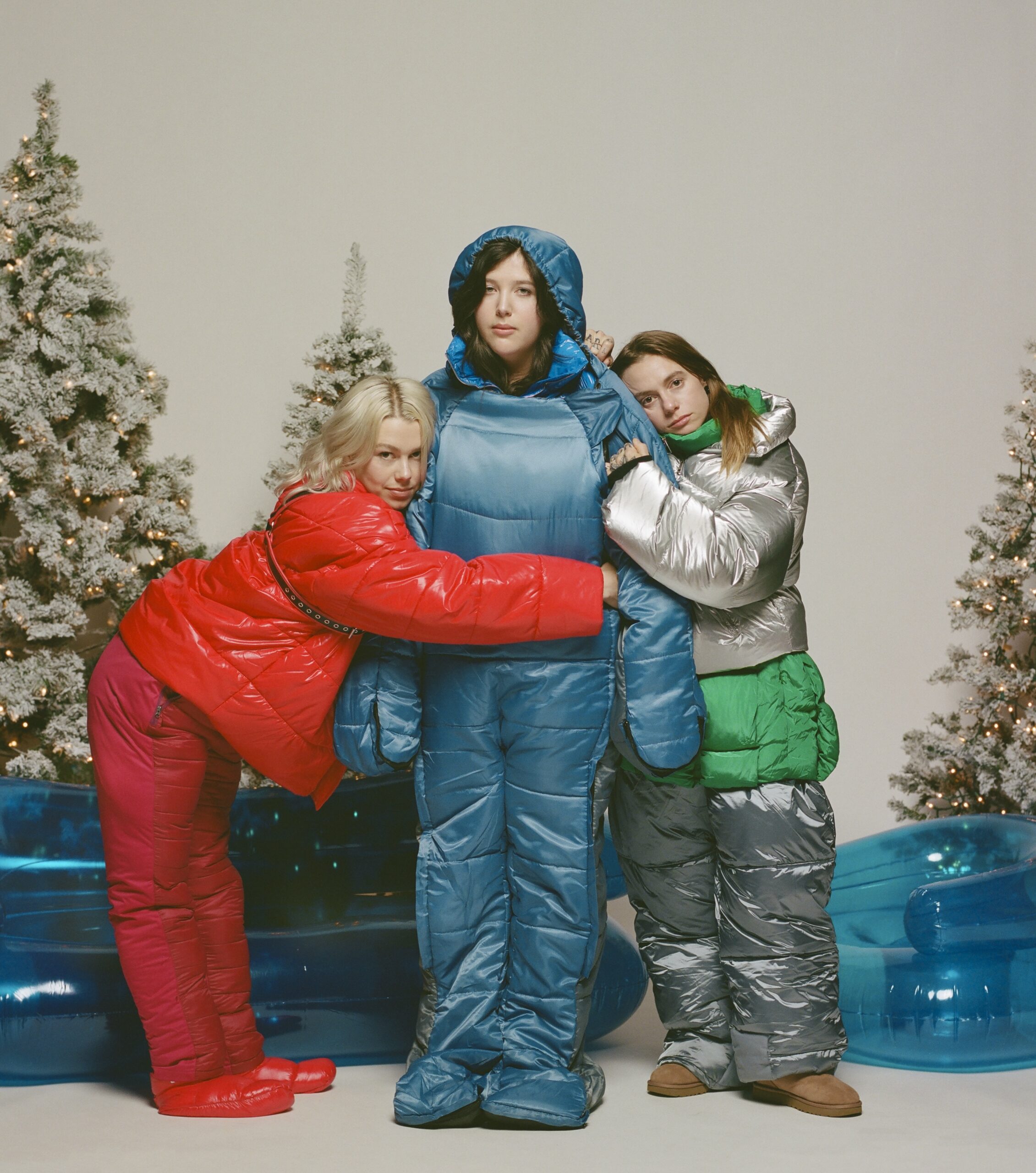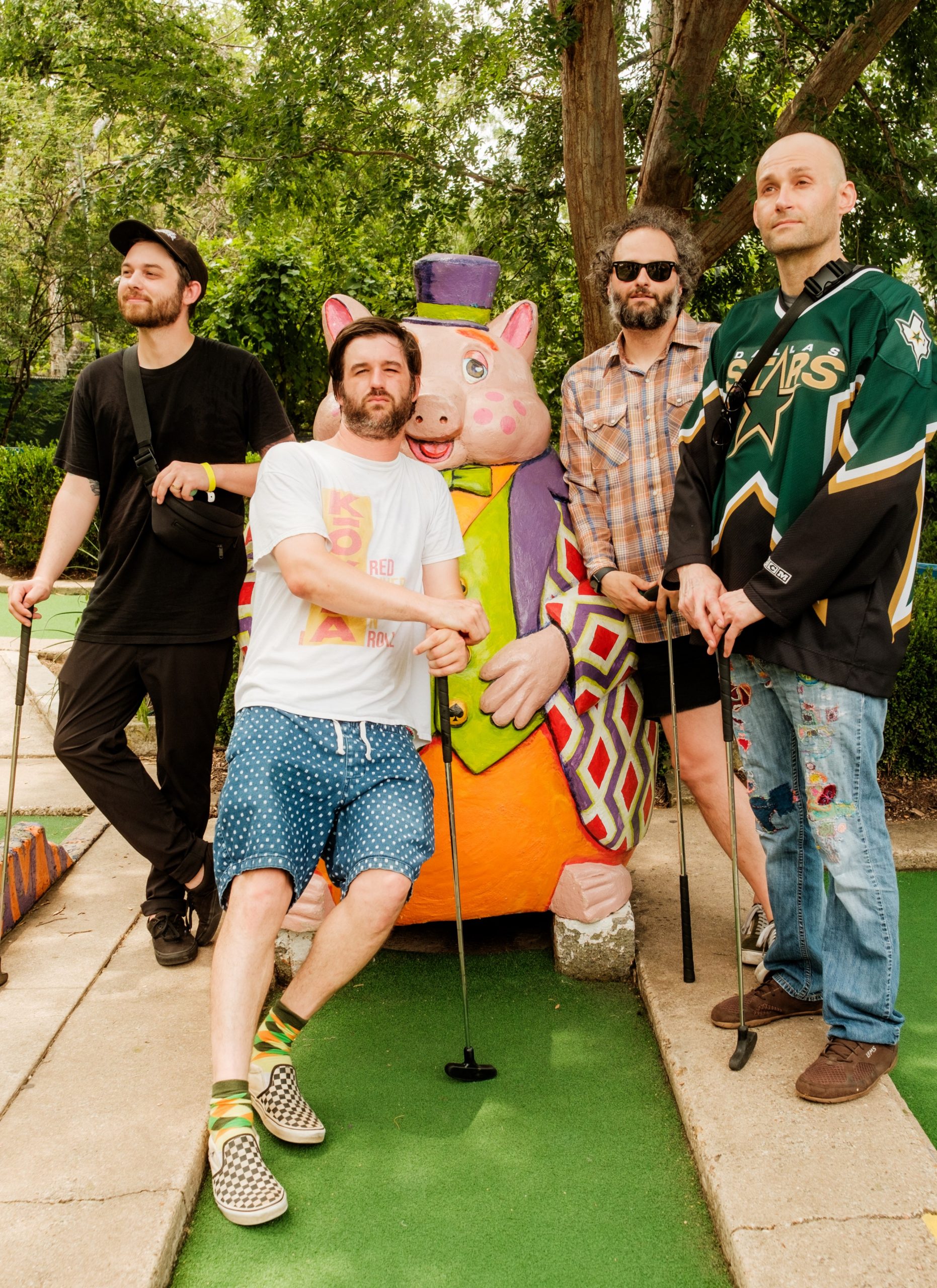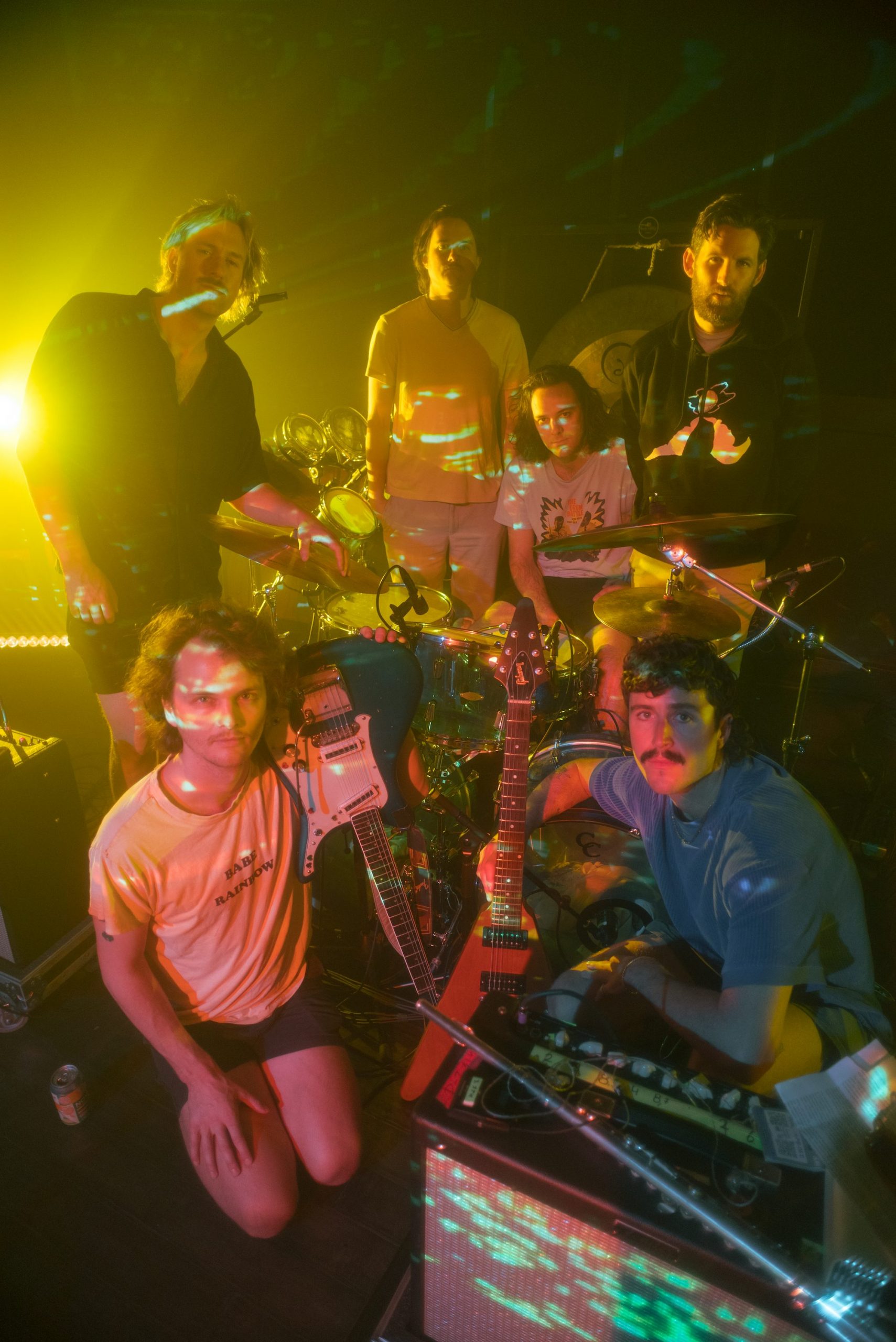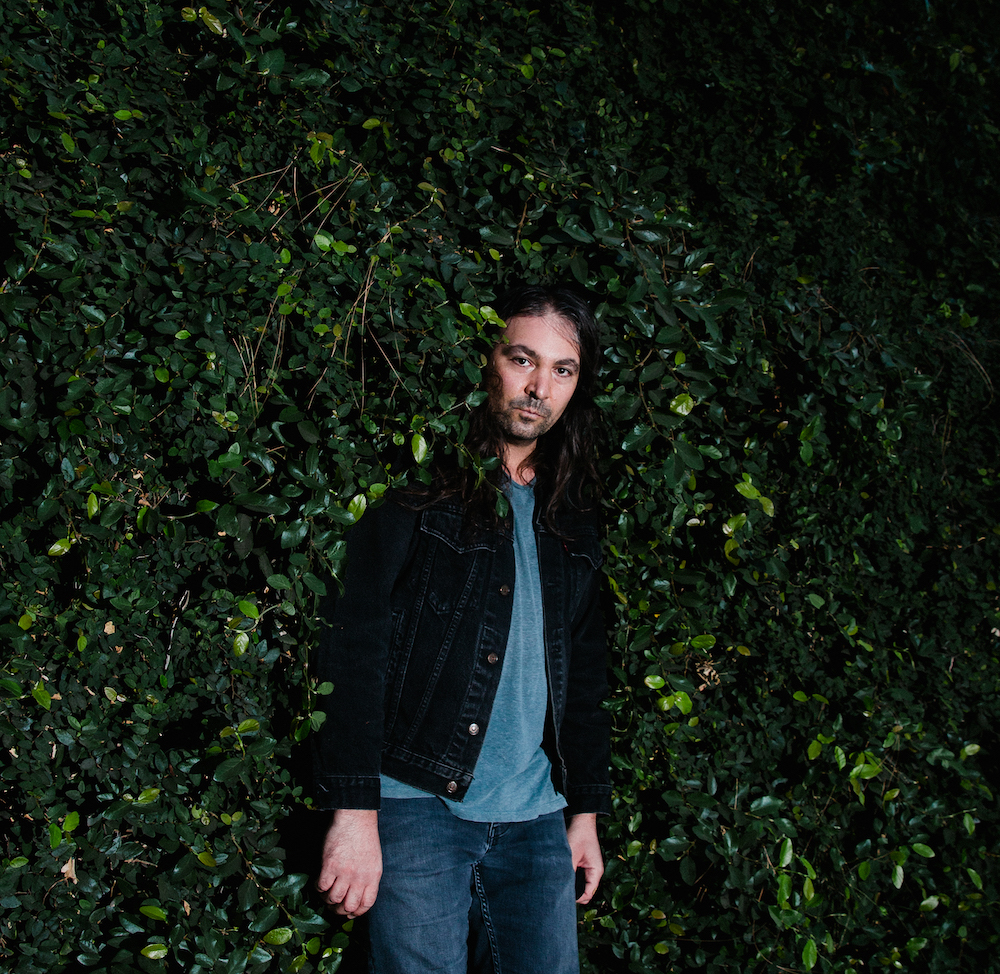There's a small plastic turtle on the dashboard of Cayetana's old blue van. Her name is Tracy. She wears red glasses and does a little side-to-side dance. The van's name is "Fast Car," after the Tracy Chapman hit that the band cranks every time they head out to the next show. They're aware it's an odd choice.
Cayetana have agreed to spend the afternoon showing me around Philadelphia, a city that has quietly become the unexpected capital of American rock music. We've just exited Long In The Tooth, the band's favorite record store. While the store's clerk went on about some group who sounded like "a British Marked Men," Cayetana's singer and guitarist, Augusta Koch -- her hair bluer than her jean jacket -- eyed a vinyl copy of Bob Mould's The District Line. She picked it up, and then decided she should probably not spend too much this week. Before we left, she grabbed a copy of the new Mountain Goats album, and drummer Kelly Olsen -- wearing a vintage but, I'm told, not ironic New York Mets T-shirt -- bought a copy of the Muffs' Whoop Dee Do, even though she's moving soon and it's going to be just one more thing to pack.
Before we get back into the Fast Car, bassist Allegra Anka -- dressed like the only member of the band who works in an office -- removes some gnarled plastic sheeting that wrapped around the right front tire. There's always trash on the street. I hear this again and again this weekend. People will just throw their soda bottles on the ground when they're done with them, and it gets disgusting when there's a strong wind. But other than that, everyone tells me, Philadelphia is pretty great.
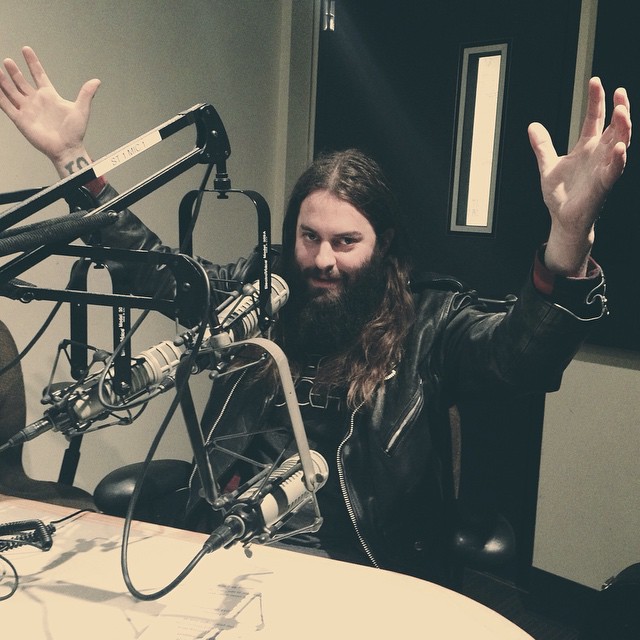
"I can usually tell when something's happening, more than not, by the increase of phone calls I get from A&R guys," says Bruce Warren, assistant station manager for WXPN, Philadelphia's listener-supported radio station. "Last year, every week I got a phone call from someone, indie and major, asking, 'Who's the band that I need to see?' They're smelling blood."
Warren has been a Philly Boy Roy for the local scene for a while now. He started at the station as a volunteer 26 years ago, and remembers when the commercial stations finally caved and started spinning local joke-punks the Dead Milkmen in the late '80s "to get cred." He's thin, wearing a red sweater, and prone to speaking in the modulated diction of someone who has spent a lifetime in broadcast. In the corner of his office is a platinum plaque for Vampire Weekend's Modern Vampires Of The City.
One of the first things Warren impresses upon me is that the Philadelphia music scene has always been great, and he's correct. This town has given the world the Roots, Jill Scott, Will Smith, Todd Rundgren, Diplo, Gamble & Huff, and the Philadelphia Sound; Warren even has nice things to say about the Hooters. But six years ago, Warren began to notice a proliferation of new bands, venues, and recording studios in his hometown. The rising buzz inspired him to help create the Key, a section of the WXPN website designed to highlight local talent. It launched in 2010, and nearly every significant band in Philadelphia was featured on the site -- and there's no small amount of significant bands in town these days.
The popularity of unapologetic rock 'n' roll has waxed considerably this decade, on both a mainstream and underground level, but it seems like this entire town has taken it upon itself to pick up the slack. From Cayetana to Strand Of Oaks, Modern Baseball to Restorations, Swearin' to Pissed Jeans, Nothing to Hop Along, Purling Hiss to Sheer Mag, Philadelphia has more exciting young bands in one place than any town in America. If one still has a soft spot for cheap rock thrills, this town can feel like the promised land. (The hip-hop and DJ scenes also boast rising talent, including Ground Up, Chilly Moody, Tianii Victoria, and Tributaries, but that's a trip for another day.)
"Has it been done before? Absolutely," says Warren, his eyes moving back and forth rapidly after rattling off a long list of some of his favorite current bands. "But it's just refreshing, and their take on [rock music] is really exciting, and it's affecting people. That, to me, is really the most important thing."
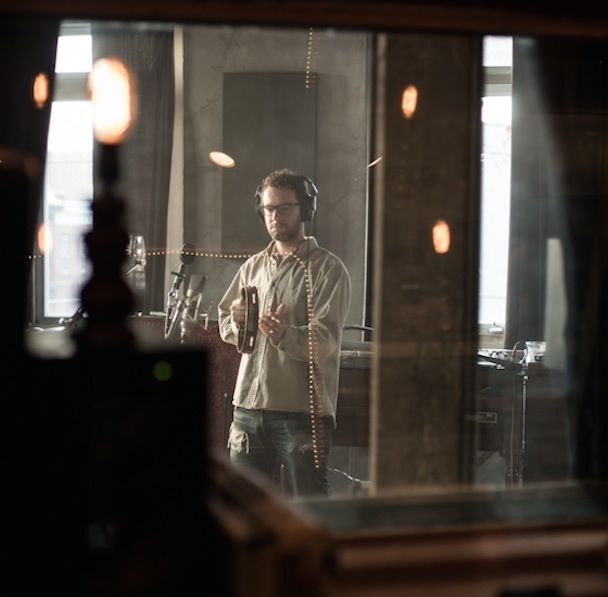
As deep as the bench is for Philadelphia, the main reason Warren's phone has been buzzing as of late has been the breakout success of Philadelphia's most high-profile recent exports. Folkadelic singer-songwriter Kurt Vile and heartland space-rockers the War On Drugs have been tied together since Vile moved back to his hometown nearly a decade ago, after a short and unhappy stay in Boston. During their incubation stage, Vile was a member of the War On Drugs, whose frontman, Adam Granduciel, also played for a while in Vile's backing group, the Violators. One of the War On Drugs' very first shows was opening for Vile at a tiny Philadelphia club called the Fire.
"They played, it was a big crowd, and it was time for me to play, just by myself, and there was nobody there," says Vile. "I stunk anyway. It was funny! But that was like the first wave. We tapped into this style together."
Before Vile signed with Matador Records and released his 2011 breakthrough record Smoke Ring For My Halo and his 2013 stoner-dad classic Wakin On A Pretty Daze, two yearning explorations into the awesome power of love and languid guitar tones, he worked at a brewery by day, bottling beer and driving a forklift, and played every open mic, bookstore gig, and opening slot he could get. His job was mind-numbing and repetitive, but at least he could almost do it in his sleep.
"I think I recorded some of my best stuff having worked 40 hours a week and staying up all night anyway to record and going into work in a fog," says Vile. "There's a certain kind of urgency in those records. Me and Adam recording Kurt Vile stuff, War On Drugs too. I look back on them and think of being in this dirty hallway to get this 12-string sound or something -- delirious, on no sleep."
Starting in 2006, Vile and Granduciel, along with producer Jeff Zeigler, were constantly recording songs, obsessively honing their widescreen classic-pop approach. "I think I gravitate more toward things that are fundamentally pop-song based, but with an openness to do something that is more experimental -- something you can sit back and take in," says Zeigler, who would go on to co-produce full-lengths for both artists and several other Philadelphians. "Those guys are both into a lot of stuff, and come from a shared appreciation of krautrock stuff and experimental composers, they have that broader palette and refine that into what they individually do."
When Granduciel wasn't obsessively recording, he and War On Drugs bassist/founding member David Hartley were working at a Philadelphia company called University City Housing, cleaning up college apartments and helping run open houses. "In hindsight it was really hilarious because we were both just really scraggly, skinny musician-y dudes who had no business occupying any sort of professional atmosphere," says Hartley, "and we were sort of the two linchpins of this pretty huge operation. Eventually we got fired, but that was a fun time because there were a lot of other musicians working there. Kurt would pop in because at the time he was working for the Philadelphia Brewing Company and would be delivering kegs to the bars. People would come into work hung over, with rough mixes and demos on CD-Rs, and we'd drive around in the company cars getting stoned and listening to them. It was a little bit competitive."
Shit jobs that you don't need to give a shit about are helpful for any musician, but they're a way of life in Philadelphia. By all accounts, nearly every coffee shop, bar, record store, print shop, or cool gastro pub was either started or infiltrated by an aging scenester; the old punks are always there to hook you up with the type of job where no one cares if you're visibly hung over. It's how one generation of Philadelphia musicians takes care of the next.
"It's just cheap as hell," says Hartley. "It's getting less cheap, but if you compare it to Brooklyn or something, it's not even close. What that does is, it sort of loosens the noose around the neck of the artist, because you can afford to maybe work at a coffee shop like 35 hours a week. You know you'll still be scraping by, but that's kind of the point. With the rest of your time, you go with friends to see shows, and you work on music in your bedroom, and you jam with as many people as you can. It sounds sort of contrived the way I'm putting it, but I definitely lived that, along with everybody else in the band and everybody else that I know who is now a successful musician from Philly. None of them were living out in the 'burbs working at a cubicle. It's just not how it works."
Hartley moved to Philadelphia after graduating college and spending some time living in the Virgin Islands. He lived in a friend's spare room for $200 a month ("He was like, 'Man there are so many bands here, and they all need bass players,' and that was enough for me"), but his first block was filled with too many bros and too many Jell-O shots. It all made more sense when he moved to Fishtown, right as it was changing from a neighborhood most reasonable people would avoid to the place students and artists were remaking.
When I talked to him for this story, Hartley was packing up his coffee rig before the War On Drugs left for their most recent tour. This trek would see them play the biggest stages of their career, including a sundown set at Coachella. Last year the War On Drugs released Lost In The Dream, a gorgeous paean to heartland rock nostalgia and fighting off your demons with as much multi-tracking as possible. It topped critics list, dramatically increased the band's font size on festival posters, and turned them from a respected club-size act into something of a modern standard-bearer.
Neither Vile nor the War On Drugs is a household name, and barring a major sea change at American radio, neither is likely to have a true mainstream hit. But both are well on their way to career paths along the lines of Wilco and My Morning Jacket, where an ear for adventurous sounds blends with satisfying classic-rock songwriting. They've established Philadelphia as a major player in modern left-of-center music in a way that no other recent rock band has. But while the War On Drugs and Kurt Vile have gotten the most attention, the bands that have sprung up just outside of their spotlight prove that Philadelphia isn't just on the come-up, it's now the biggest game around.
"I feel like when I came here, heavy rock was not really happening in any of the bands I knew," says Hartley. "It was all sort of chilled-out spacey-ness. That's why the new wave of bands is crazy. I just kind of turned my head for a year and then came back and there was a new crowd of great bands. The big story is that there's this bubbling thing happening in basements and bedrooms and garages right now that we don't even know about because it's truly a little bit under the radar. That's actually the most important thing happening right now ... just the kids working on the next thing."

Earlier in our trip, Cayetana took me to the graffiti mural that was immortalized on the cover of Wakin On A Pretty Daze. The mural was covered up last summer, but quickly restored after local outcry, and has lost none of its '70s Saturday morning-cartoon vibrancy. None of the members of Cayetana (noteworthy band pins on their jackets: Sleater-Kinney, Sunny Day Real Estate, PUP) are avid listeners of Vile, but they all make sure to stress that they're happy to see anyone from Philadelphia make it.
After we get in the van, Anka points out the window: "That guy is wearing a Cayetana shirt," as a guy walks by the van, unaware, in a black jacket and a black shirt with the band's logo.
"We should honk at him," offers Koch.
"We should tell him to fuck off," counters Olsen. "Just kidding." She grins.

Growing up, Liam Wilson would avoid going to Fishtown at all costs. A northeastern neighborhood once synonymous with crime and poverty, it was long considered one of the most dangerous parts of Philadelphia.
A recently lapsed vegan and meditation enthusiast whose calm yoga-teacher demeanor contrasts sharply with his ornate tattoos and the music he makes as the bassist for the Dillinger Escape Plan -- a Philadelphia institution and one of the most brutal and intricate heavy metal bands in America -- Wilson rolled his eyes whenever he heard that Fishtown was the hot new neighborhood in town. "But once I saw the bars, hair salons and yoga studios," he says, "and once the artists are looking for warehouse spaces, it's happening." He and his wife eventually bought a Fight Club-looking house with no electricity or anything resembling human amenities, but good bones, as they say on TV. "I thought, 'I can do what I want here,' Wilson says, "and I think a lot of people looked at Fishtown the same way. There are so many vacant lots here, it's ready to be redone."
In addition to the de rigueur farm-to-table eateries and record stores that recent college graduates demand, Fishtown is home to several key venues, including the Barbary and Kung Fu Necktie, and the studio Miner Street Recordings, where Vile, the War On Drugs, and many other Philadelphia acts have cut albums, aided by a MCI 440 console used by Madonna and the Talking Heads. Producer and studio owner Brian McTear picked it up on the cheap, as "it's not as in demand as you'd think," he says, owing to the arduous upkeep. (He also owns a tape machine once used by Toto, and has been in Fishtown since it was the type of place where you could get jumped for looking like you went to college.)
I'm sitting at an outdoor table at Johnny Brenda's, ground zero for the Fishtown renaissance, joined by Wilson, Chris Ward, talent buyer for the venue, and DIY magnate Sean Agnew. Brenda's opened as a bar and restaurant in 2003, and was one of the first places in America to offer only local beer. A 250-capacity music venue, with dark red drapes and gold cherubs on the wall, it opened in 2006. Ward played there a few times with his band Pattern Is Movement before he started doing front-of-house sound and interning; he eventually took over booking duties when the original talent buyer left. Since then, the venue has served as the bridge between the all-ages warehouse and basement scene and the 21-and-up commercial venue scene; every significant Philadelphia act has played its stages, and there was a time when it was common to find Vile or Granduciel just stopping in for a beer.
An excitable man prone to philosophical conversational detours, Ward has a giant beard, thick-frame glasses, and a firm conviction that the Philadelphia music scene has always been exciting, and the rest of us are only now catching on. "The talent has been around, it's just really I think that the narrative changed," he says, "and Philadelphia has been going through a resurgence as a city."
He has a point. Last decade saw area acts like Dillinger Escape Plan as well as the Tom Waits-ian carnival barkers Man Man, the Steve Earle- and Nick Hornby-endorsed Marah, the Beach Boys acolytes Dr. Dog, and the post-hardcore outfit Circa Survive earn some recognition, though their successes felt like isolated incidents, and entirely unlike the moment the city is currently experiencing.
Two key musical movements that gained steam in the aughts helped set the scene for Philadelphia's current musical boom. The first was a wave of psychedelic folk artists such as Bardo Pond, the Espers, and especially the late guitarist Jack Rose, a former Brenda's line cook who had no problems telling you to shut up if you were talking during his set. Rose's expansive, intricate playing ("He was the best guitar player for sure," says Vile. "He did Fahey better than Fahey") is almost as revered as his no-bullshit demeanor, which helped establish a songwriting-first, hype-never ethos that remains the rule in town to this day. "I was some kid that grew up in the suburbs who maybe had some misconceptions about what made music good," says Hartley. "Nothing will set you straight like seeing authenticity in your peers over and over again."
The second movement was the back-breaking work spearheaded by Agnew, a wiry, eternal hardcore kid who had been booking DIY shows in basements, warehouses, art venues, and abandoned houses since he was 18 -- and now, with his company R5 Productions, also books shows at Brenda's and other local commercial venues. While working at Drexel University's student radio station WKDU his freshmen year, he met "a bunch of kids there who were setting up their own shows. And it was a fairly new concept to me. I was just going to shows at venues and didn't realize that bands were playing at warehouses and galleries and stuff." It was 1995, and he immediately started helping out, booking emo and ska and hardcore shows, eventually dropping out of college to focus on it full-time. As his friends -- guys with scene names like Mike Supermodel and Bobby Redcheeks -- got older and moved on from the scene, Agnew stepped up and continued their work. "I never set out to do it as a company or any sort of job. It was just a hobby."
He booked shows at the venues Stalag 13, the Fake House, and Kill Time, which were three warehouses all next to each other. "It was a way more dangerous and scary version of 285 Kent, Glasslands, and Death By Audio," Agnew says, referencing the recently shuttered Brooklyn DIY venues, "with way more sketchy punks with face tattoos and people squatting in houses." He established the venues the Rotunda and 4040 on the University Of Pennsylvania's campus and helped open Johnny Brenda's venue. He booked basement shows for punk trailblazers like Refused and Lifetime, lesser-known scene mainstays like Plow United and Dissucks, and local hardcore legends Ink & Dagger, a vampire-themed band that once included Eric Wareheim (of Tim & Eric) and whose singer, the late Sean Patrick McCabe, was a continual source of scene gossip. ("There was always tales of him picking up girls and ditching them at highway rest stops.")
Agnew wasn't the first to do it, but he started regularly booking shows at the First Unitarian Church Of Philadelphia, a space that has become so synonymous with Philadelphia that touring acts like Future Islands specifically ask to play it when they could easily sell out larger venues. It's still a working church, and Agnew and his team have to remove the church's daycare equipment and set up the PA every time there's a show; it's usually unavailable on the weekends because the church is holding AA meetings. ("At the end of the night, we'd wrap up all the cables, PA equipment, mixing console, carry it all up the steps, load it all into a van, come back down, mop the floor, and setup the daycare again," says Wilson, who often helped out. "We'd rarely be out of there before like 1:30am.") He also booked shows for Rose and the Espers at an art gallery called Vox Populi, which soon became the city's experimental music hub: Thurston Moore, Sunn O))), pre-breakthrough Animal Collective, and Melt Banana all played there, and one time there was a show where a guy played a tree.
Philadelphia has widely deplored laws that make it unreasonably difficult for venues to have all-ages shows if there's also a working bar on the premise; a venue would be required to have alcohol served in a secure section away from the underage patrons, often on a separate floor or wing of the building, where no one under the age of 21 could access it. It is such a hassle that many smaller commercial venues don't even bother with all-ages shows, so the work Agnew and other DIY promoters did was vitally important in making sure Philadelphia's kids had access to live music, and in making sure musicians had access to fans. "A band would come play a 21-and-up venue in town they would do 100, 150 people," Agnew says. "They would come to the church and there would be 500 people there."
The kids that attended his shows saw that it was possible to make a space of your own, and the venues they opened, including the Golden Tea House and the Titan House, along with Agnew's venues, helped the next generation of Philadelphia punk groups like Modern Baseball and Swearin' blossom. Agnew waves off any attempt to credit this to him, but people who saw what he built won't let him be so modest.
"This city is in his debt. It's his creation, the fact that Philadelphia is run by people who get it," says Agnew's friend Matt Korvette, frontman for Pissed Jeans. Korvette's band doesn't tour very often, but he still sees shows around town frequently. Though he admits that much of the current scene isn't his thing ("Young kids playing poppy punk. It's cool, but it's not what I'm hungry for") he still marvels at how, unlike many major cities, Philadelphia has managed to avoid getting sucked dry by bottom-line-obsessed conglomerates.
"We don't have to go to a club here where seven security guards pat us down, where we have to pay $20 for a drink and we're forced into an awful room where the sound sucks," he says. "Here you bought the tickets at a record store, the venue is great, and there's vegan ice cream and pizza for sale."

Until 1987, Philadelphia City Hall was the largest building in town. On top of it was a statue of William Penn, the founder of Pennsylvania. "Legally you weren't allowed to build taller than Billy Penn, which is 26 stories or something," Wilson says. "And the whole point was humility: We're a neighborhood, we're down to earth, we don't need to be ostentatious like New York."
When a skyscraper was later built that was bigger than City Hall, the "Billy Penn Curse" was often cited by the superstitious as the reason the town's sports teams didn't win anything for decades. A year after a small statue of Penn was placed on top of the Comcast Center, the city's current largest building, the Philadelphia Phillies won the World Series in 2008. "The Phillies are in some ways a good symbol of Philadelphia determination. They're a franchise that doesn't have a ton of money and works their asses off," says Ward. "It's a blue-collar town. There's not a lot of wealth in this town. It's not like New York or LA or Chicago where you have actual enterprise."
This is a town with complicated self-esteem issues. In 2005, the New York Times published an article called "The Next Borough," which detailed how some people would work in New York and live in Philadelphia, because the cost of living was dramatically cheaper and the commute was relatively easy. (It takes a little bit more than an hour to get between the two cities by train, and less than two hours if you want to drive.) A decade later, people are still mad about this article and bring it up without provocation. "I don't ever recall thinking of Philadelphia with respect to New York," McTear says. "I've been here for 20 years, and that's never occurred to me once." But Ward admits it did make his job a little easier.
"A lot of agents and a lot of bands tell me, years ago you would skip over Philadelphia, you just wouldn't play here," he says. But while Philadelphia has the talent, infrastructure, and rich musical history, it's never been seen as cool. In return, fans and musicians have instead taken a focus-on-the-basics approach, eschewing anything that seems remotely hip-for-hip's sake. "It's typically harder to woo a crowd here, if there's a hype band. Everyone's like, 'Nah.' They see right through it," Ward says. When he first started booking shows, he took a chance on an act that had recently scored a Best New Music distinction from Pitchfork. "I threw down a huge guarantee and no one came. No one cared. [The singer] got so aggravated on stage that he threw a glass at the balcony."
But a funny thing happened while Philadelphia languished in Brooklyn's shadow: It ended up outlasting it. While the Brooklyn neighborhoods Williamsburg and Greenpoint have been viewed as the centers of alternative culture for most of this century, the rising costs of living in the neighborhoods and the closing of key DIY venues like Death By Audio and 285 Kent have had a chilling effect on the scene. Just recently, free-show mainstay the Brooklyn Bazaar lost its longtime location to BMW. Artists have been forced to move elsewhere, even to once-dreaded climates like New Jersey and Philadelphia. Both Katie and Allison Crutchfield, the twin sisters that front the art-folk project Waxahatchee and fuzzy punks Swearin', relocated to Philadelphia after stints in Brooklyn, and the scratchy minimalist duo Girlpool moved here from Los Angeles this past January. "We both grew up in L.A. and wanted a change of pace and scenery," bassist Harmony Tividad told the Philadelphia City Paper. "It's been really inspiring being surrounded by so many creative and conscientious people here."
Hop Along singer and guitarist Frances Quinlan played at the Crutchfields's 18th birthday party, well before the sisters moved to town as part of an ongoing influx of young talent in search of a livable community. Quinlan grew up in the "rural suburbs" of New Jersey and went to college in Baltimore. She was reluctant to move to Philadelphia at first. "I thought it was too close to my hometown," she says. But her drummer and brother Mark was living there, "and he invited me to come live in his basement for next to nothing."
Earlier this year Hop Along released their acclaimed sophomore album, Painted Shut, a cathartic collection of basement-pop poetry, on Saddle Creek, and went on tour with the scene ambassadors the War On Drugs. ("At one point, I was kind of sick, and Adam [Granduciel] gave me some of his concentrated vitamin C and oregano oil," she says. "It tasted really gross, but it was really helpful.") "It's funny, I feel like people are moving to Philly, but a lot of them aren't necessarily new musicians to me," she says. "I feel like Philly is so conducive to artists now. It's the most affordable place to be. New York is just impossible for a lot of people who are trying to make music or art."
One of the musicians who had to flee is Sean Yeaton, jovial bassist for Parquet Courts. Last year, Yeaton and his wife moved to Fishtown after the birth of their first child. He continues to commute to Brooklyn for band practice. "I was in a tidal wave where it seemed that rent was really high and people couldn't afford to keep their spaces open or stay in Brooklyn," he says. "It reached a zenith in the last six months or so." Though he's quick to say there are a number of young New York groups still at it, and that he's sure the promoters behind DBA and 285 Kent "aren't through making their statement on DIY culture," he also says that, "even if New York crumbled into decay and no one wanted to live there anymore, I don't think, in my lifetime, I'll ever see lower rent prices where I could feel comfortable living there again."
Tim Showalter can relate. "I see so many friends of mine are like moving from New York to Nashville or to other places like that because they're like, 'Wait, I was sharing an apartment with five people and I can just buy a house in east Nashville now?'" Last year Showalter's group, Strand Of Oaks, released their breakthrough album, HEAL, a scratchy love letter to Jason Molina and early Smashing Pumpkins that earned critical raves and became one of the most-played albums on XPN.
Like Vile and War On Drugs, Strand Of Oaks released a number of albums to positive if not rapturous response before scoring a breakthrough. Showalter credits the affordability of Philadelphia -- he currently rents a rehearsal space for $150 a month and "pays nothing" for his home -- with giving him the time and space to figure out what he wanted to do as an artist without having to worry about how he was going to keep his head above water.
"I'm in my 30s, and there's something that happens, at least for me, where you just stop giving a shit," he says. "We didn't wanna adhere to any trends, but because of that we kind of made our own trend and our own sound, and that's the most beautiful thing when that happens. This scene feels real. It feels like real bands come from here, not just flavor-of-the-month kind of stuff, but bands that are gonna have 10-20 year careers."
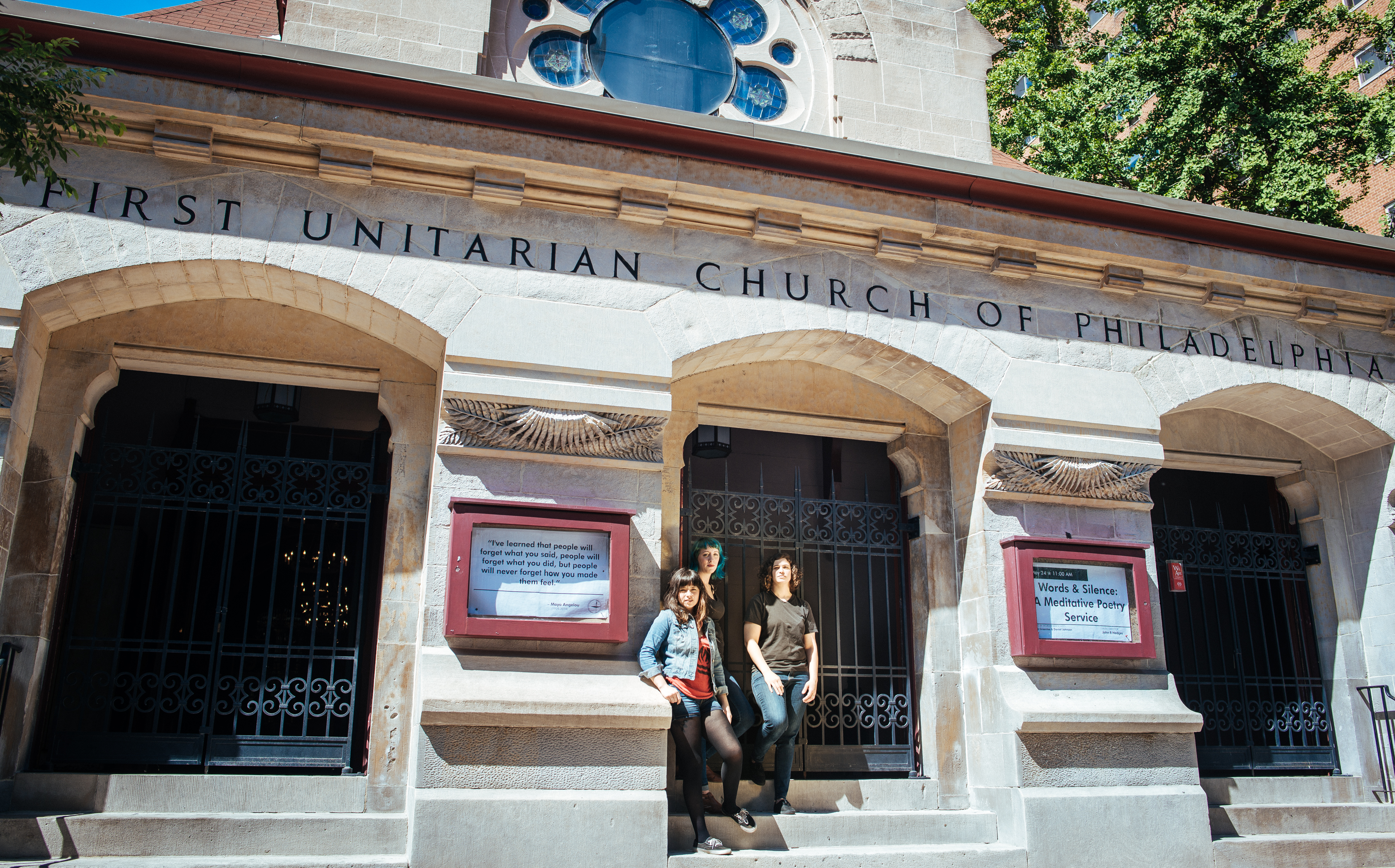
The first time Cayetana ever attended a show at the First Unitarian Church, they rode their scooters over. "Like dorks," says Olsen.
We drive by the Union Transfer; it's not that far from the Church, at least in terms of miles. A former Spaghetti Warehouse with the Notorious B.I.G. lyric "It was all a dream" spray-painted on the side, it's one of the big rooms of Philadelphia; the War On Drugs recently sold it out. One year after their first show, Cayetana were invited to open for the Thermals there.
"It was the scariest day of my life," Koch says.
"It was like the first time we ever soundchecked," Olsen says.
"We never had a soundcheck that was real," Koch says.
"And that was just a nightmare," Olsen says.
"And we love the Thermals, too" Koch says, "so I was like sweating all over the place."
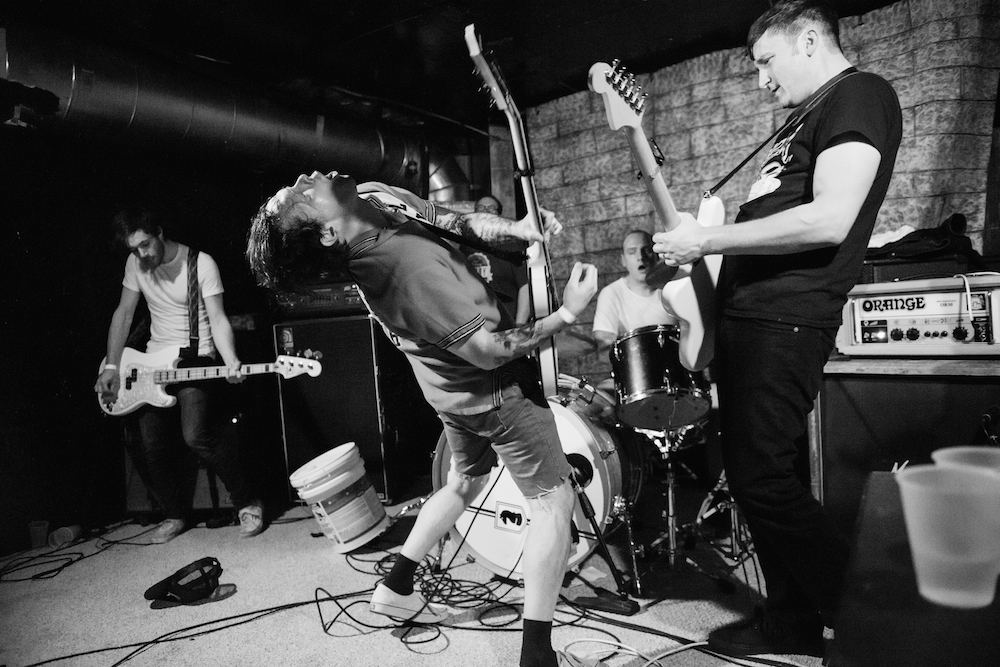
There's a broken Pac-Man arcade game in the corner of the lobby of WKDU/91.7, Drexel University's student station, and a bin of old Atari games stashed in the corner. In addition to being a full-time Drexel student, DJ Eric Osman manages Cayetana, Modern Baseball, and Beach Slang, whose singer is meeting me at the station. But while Beach Slang are a young band -- they made their debut at the DIY venue the Golden Tea House two years ago -- their frontman James Alex has been playing and attending punk shows since the late '80s.
Alex is wearing merlot-colored pants, a flannel shirt, and a Rick Nielsen-worthy baseball cap; his arms are covered in tattoos, but he has the soft face and "aw shucks" demeanor of an eternal schoolboy. Last year his band released two EPs, Cheap Thrills On A Dead End Street and Who Would Ever Want Something So Broken?, which featured distortion-laden anthems that felt plucked from a Replacements-hosted episode of 120 Minutes. The band released Cheap Thrills On A Dead End Street via the indie label Tiny Engines last May; within a year they were signed to Polyvinyl and touring Europe. Their debut album will be out in the fall. "People have asked, how have you managed to get this big this quickly?" he says. "If I knew how, I would have done it already."
Alex got his start playing in the pogo-ready Philadelphia pop-punk group Weston, who spent most of the '90s recording for Go-Kart Records, but were "scooped up" by Universal Records for their 2000 bow-out The Massed Albert Sounds. Universal's hopes to find another Warped Tour headliner didn't factor in the band's complete exhaustion. Disillusioned with the fan backlash to their major-label debut, which saw them try to move away from their pop-punk sound, they broke up a few days into their headlining tour. Alex went to art school and worked as a graphic designer. One day his colleague JP Flexner told him they should play some of the songs he'd been writing in secret.
"The spark that went away in Weston, this felt like that sort of re-ignition -- I really felt like I was 16, 17 again, picking it up. It felt really, really right." Alex will be 40 soon, but he feels like he's finally getting started. "I don't know that I've done meaningful work before. It's all just been the path to get here," he says. "I look at my friends, and it's like, man, we're still here. We did it. We believed in it and we're still these kids in the scene."
More than most of the up-and-comers, Beach Slang span generations. The band's bassist and drummer are in their 20s and early 30s, while Alex has memories of attending some of R5's earliest shows. He's a lifer in a city full of lifers. In a town that willfully ignores the comings and goings of trends, there's always a second chance here to figure out who you really are.
Jon Loudon is only 31, but he wants to be a lifer when he grows up. The generation of punk musicians, bookers, and fans that preceded him taught him everything he knows. Every time the singer and guitarist for Restorations says the phrase "the old heads," which is often, he does so with a twinge of awe in his voice. These are the people who "used to be fighting skinheads with bats and guns" at early hardcore shows, that went on to build the infrastructure of DIY and commercial venues that allow bands like his to thrive. "If you start a band here, you're going to have all these old heads just coming down on you all the time, showing you how to do it," he says. An old head he was opening for once told him, "You're a Philly band -- you come to the front of the stage, you don't look backwards, you don't make jokes in-between songs. You play."
"The old heads all run shit in this town, still," says Loudon, sitting in Johnny Brenda's balcony with his bandmate Ben Pierce a few hours before Restorations' homecoming show. For years, Loudon, a thin, achingly sincere man whose baby face contrasts sharply with the gruff, pack-an-hour bellow he sings with, played in a "spazzy, early 2000s post-hardcore band" called Jena Berlin. They played 200 shows a year, "and it just didn't go anywhere," he says. The peak of their popularity was playing for 75 people in a basement show in DC, opening for Title Fight and the Menzingers.
"You spend your whole time being like, 'We're a punk band, we're playing for a punk audience, why is this not connecting with punk people?'" Feeling washed up before he turned 30, his band broke up, he got fired, twice, from his magazine writing job, and went through a period of "sleeping in warehouses and living in places that just weren't up to ... anything. I was homeless for a minute, that kind of thing."
Eventually, he formed Restorations with some of his old band mates and scene friends. Taking inspiration from the anthemic Canadian group the Constantines, Restorations found Loudon moving past hardcore orthodoxy toward an ideal balance between punk vigor and widescreen sweep. Their label pulled out during the recording of their debut album, and he again assumed no one would care. But to his surprise, once he stopped trying so hard to conform to a punk ideal, "all the old heads, all the Jawbreaker people and the Fugazi people and the Archers Of Loaf people" started going to his band's shows. "The second I stopped trying," he says, "I connected with the thing I wanted to connect with the entire time."
Philadelphia is a town that places a high premium on doing it yourself. It also values being yourself. Even if that means playing a deeply uncool style that you love dearly.
"Nobody pressures anyone to make a certain kind of music or to not make a certain kind of music," says Jake Ewald, singer and guitarist for Modern Baseball. "There were definitely bands in Philly who make punky, poppy music that on a surface level might sound like a band that you really hate. But they're doing it their own way, and they're expressing it in a DIY sense. You can tell that they're really putting their heart into it."
Growing up in "a suburb of a suburb" of Maryland, Ewald's scene consisted of the exact same four bands playing the same space every month. Shortly after he started school in Drexel, kids from the college radio station took him to his first Philadelphia punk house show. "It was like everything that my hometown was trying so hard to do, but just couldn't make it happen," he says. "Every other day there's a show in somebody's basement with, like, three different bands from across the country."
Sporting a mustache that I get the sense he's only recently been able to fully pull off, Ewald met me at a Fishtown coffee place called Rocket Cat Café, whose Wi-Fi password that day was "Leonardo Dicatmeow." He admits that it took him time to figure out the scene; he's still embarrassed about the time in his freshmen year when he showed up to a punk house two hours early, wearing flip-flops, no less. But eventually with a friend from back home and his new classmates, formed the witty and wired group Modern Baseball, who've been threatening to give pop-punk a good name since 2012. (An earlier version of the band existed when Ewald was still in high school.) Their sophomore album, You're Gonna Miss It All, was the best Weezer album of 2014, and this summer they'll tour with Say Anything and Cymbals Eat Guitars; sometime next year Ewald hopes to finish college. (He's currently studying recording and hopes to find a warehouse to open a small studio soon.)
With their sharp wordplay, unpolished approach, and relentless gigging ("We played twice every weekend"), Modern Baseball quickly attracted a local crowd that would know all the words to songs that hadn't even been officially released -- or, at times, recorded yet. He still sounds awestruck that not only did people in the scene want to be friends with "a dorky freshmen" like himself, but that people in the scene were eager to hear new bands all the time. Modern Baseball could have a great career ahead of them, but Ewald says he knew his band "made it" at an early house show where "everybody knew the words, and everybody was just pouring beer on each other, and it was all really stupid," he says. "I was like, I can die happy now. Modern Baseball is cool enough for me."
If anything, Modern Baseball are concerned with making it too fast, and are careful to stay in close contact with the scene that incubated them. During their most recent national headlining tour, the band alternated between playing mid-sized commercial venues and DIY spots across the country. The outing culminated with a stop at the Live Nation-owned Theatre Of The Living Arts, one of the biggest venues in Philadelphia. "And the first thing we all wanted to do when we got home was to go to a house show and drink beer out of a backpack."

After driving by the anarchist bookstore and Tattooed Mom -- the bar where Olsen once saw Bam Margera walk in like he owned the place (no one was impressed) -- there's much discussion of what to do next. It's a shame, Koch tells me, that I'm not here in time for the Punk Rock Flea Market, or that their friends in the Epitaph punk band the Menzingers aren't home this weekend. Eventually, they decide they'll take me to Grindcore House, a vegan coffee place that only plays death metal; Olsen once sprinted over when she saw John Darnielle tweeting about it, but she arrived too late to see him. But first we're driving through a part of West Philadelphia where, Olsen says, only the professors and crust punks live; there's plenty of old, cheap housing around here if you don't mind multiple roommates and neighbors that sell drugs. (On the bright side, Ewald says, they won't call the cops when band practice gets loud.) After Olsen has to swerve to avoid hitting a trash bag, we eventually drive by the punk house where Katie Crutchfield once lived.
Anka is looking at her phone, flipping through a website dedicated to local graffiti, and discovers that the statue of Rocky was briefly vandalized. Everyone who lives in Philadelphia gets sick of hearing about that movie, as that's all some people know about the city, Olsen says. But then she concedes that it can be difficult not to get inspired by the boxing classic. Like Rocky, Cayetana are "strong underdogs," she says.
"Your band is just like Sylvester Stallone," I say.
"We're always slurring our words," she replies.

At the end of our tour, Cayetana take me to PhilaMOCA, a tiny local gallery with white walls that look like they would break if you tapped them hard enough, an iffy sound system and $3 tall boys; by the end of the night some dude has passed out on the couch in the back. Tonight's event is a bill of Philadelphia female-led punk bands, sponsored by the feminist music publication She Shreds Magazine.
In a city with no shortage of promising rock bands, many of the best are fronted by women, and this night has some of the best Philadelphia has to offer: Amanda X, Mannequin Pussy, and Anomie are on the bill, and the night is headlined by the electrifying pop-punks Swearin'; Alison Crutchfield was one of Cayetana's first supporters. Crutchfield's sister Katie is in attendance tonight, as is Speedy Ortiz singer/guitarist and She Shreds columnist Sadie Dupuis, who DJs between sets. Cayetana were also asked to play, but they'd already agreed to open for the prog-ska group RX Bandits at the Theatre Of The Living Arts, so they had to bow out.
Compared to the punk and indie scene as whole, which continues to struggle with gender parity, Philadelphia's deep bench of powerful female rock musicians (which also includes not only Waxahatchee but also up-and-comers like Girlpool and Hop Along, among many others) does sadly seem surprising, and entirely worthy of a night of celebration. This is a scene that everyone feels a responsibility to keep on the right track.
"Everybody is constantly moving forward, whether that be finding new spaces, finding new ways for people to feel more welcome at shows, and making everyone -- like, women, people of all races, people of all sexual orientations -- feel included so creativity can continue," Ewald says. "There are a lot of people that aren't afraid to say, 'This is really great, but I see an issue here and we should confront it.' Because it would be really shitty if we took this awesome, creative thing that we grew, and then let it die because people started mistreating each other."
The Philadelphia scene is welcoming almost to a fault. If your friends in the scene know you'd kinda maybe like to play some music sometime, they won't get off your case about it until you get up and play. Anka and Olsen attended SUNY Oswego in upstate New York and migrated to Philadelphia after college. In 2011 they first met Koch, who grew up in the Pocono Mountain area of upstate Pensylvania, a few months after she arrived in Philadelphia. The first time all three members of Cayetana were in the same room, it was at Titan House. The second time was their first rehearsal. Shortly after that, the members of Cayetana began learning how to play their instruments.
"I think it's a more comfortable space if you're a woman who's never been in a band before, which is what we all were, and we were completely embraced," Olsen says. "Our very first show, all of our girlfriends showed up, and we played like crap probably!"
Two years later, Cayetana released their debut Nervous Like Me, a collection of punchy indie-pop augmented with hard-earned punk muscle. It's a satisfying collection, but the album only hints at the best-friends-forever, join-the-gang charisma that Cayetana exude onstage. When they learn to capture that on record, they'll go from a band to watch to a band that's impossible to ignore.
"A lot of people are like, 'They're a pop-punk band! They're an indie band!' And we were just kinda trying to figure out what kinda music we wanted to make, and I think we're still doing that," Koch says. "A lot of that record was just about that time in our lives, kinda getting older and figuring stuff out. I think that's a big theme of the record."
Shortly after Anka first moved here, she went to a house show where the singer dedicated a song to "anybody who's queer who needs to make a space for themselves." It was the first time she ever felt safe at a show, and then she went on to do exactly that. "When I first moved to Philly, you'd show up to a show and you'd see women were playing and you'd go, 'Yeah, cool, that's awesome,'" Anka says. "And there's a period of time where you'd show up to shows and notice it, and then after a while, you don't notice it anymore. And that's fantastic."
If anything, things get so comfortable that touring is often a rude reminder that other cities haven't caught up with Philly yet. "I had a guy come up to me at the last tour, and he was like, 'I saw you get up behind that drum set, and I was like, oh, what's this gonna be? And then you started playing it, and you really surprised me! You knew how to play it!'" Olsen says. "'I'm sorry, no,'" she replied. "We're not talking anymore. You should go away."
While everyone I talked to stressed that the scene is far from perfect, its baseline is so wildly progressive that "people don't bat an eye anymore, there's no 'Hey are you with the band?' when girls are playing in the band," says Loudon, who credits the music scene for making him "a hippie" in terms of politics. "Then you go other places and it's 'oh yeah, America is in the Stone Age, I forgot.'
"Philly is light years ahead of everywhere else."
//
Listen to a playlist of Philly sounds below.
